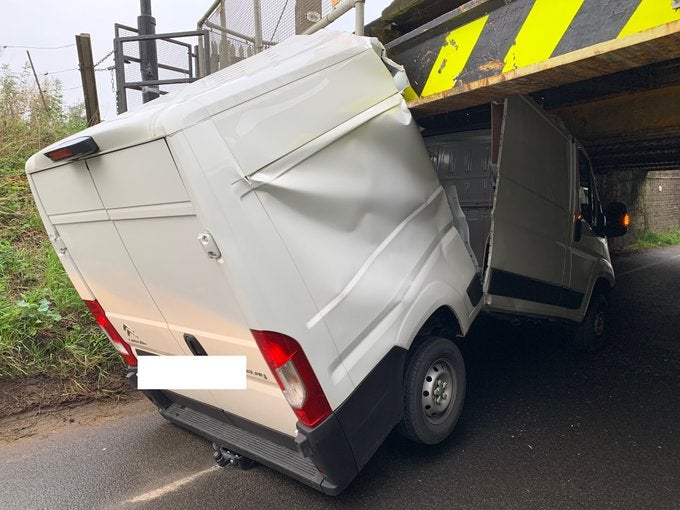The most struck railway bridge in Britain ‘with more than nine lives’
Locals regularly post pictures on social media of vehicles damaged on hitting the bridge despite the clear signage

Your support helps us to tell the story
From reproductive rights to climate change to Big Tech, The Independent is on the ground when the story is developing. Whether it's investigating the financials of Elon Musk's pro-Trump PAC or producing our latest documentary, 'The A Word', which shines a light on the American women fighting for reproductive rights, we know how important it is to parse out the facts from the messaging.
At such a critical moment in US history, we need reporters on the ground. Your donation allows us to keep sending journalists to speak to both sides of the story.
The Independent is trusted by Americans across the entire political spectrum. And unlike many other quality news outlets, we choose not to lock Americans out of our reporting and analysis with paywalls. We believe quality journalism should be available to everyone, paid for by those who can afford it.
Your support makes all the difference.With its bright signage warning drivers of the low height, some would be forgiven for believing that Stuntney Road railway bridge in Ely, Cambridgeshire would be safe from damage.
But latest figures from Network Rail have revealed the 2.7-metre-high-bridge as the most-hit across Britain.
The bridge, located next to Ely railway station, was hit on 18 on occasions in 2023/24, seeing the unfortunate crossing rise above county rival Stonea Road in Stonea (17), as well as Lower Downs Road in Wimbledon (17) in the notorious list.
Back in February, the bridge had to be closed for more than two hours after a removal van struck the structure.
“Thankfully the bridge has more than nine lives,” said a spokesperson for Cambridgeshire Police at the time.

Aside from removal trucks, social media shows many more pictures of vehicles damaged after hitting the bridge, including camper vans, HGVs, vehicle transporters and pick-up trucks.
Posting an image, one local wrote last year: “Yet another bridge strike at Ely. Despite the by-pass and massive warning signs, this happens at least once a week. What is wrong with some drivers?”
Another said: “Another one bites the dust.”
Network Rail said there were 1,532 bridge strikes in the last financial year, costing an estimated £20 million in delays, cancellations and repairs.
Delays to services due to lines being closed following bridge strikes exceeded 100 days.
However, the total number of incidents has fallen in each of the past two years, with 1,864 strikes in 2021/22 and 1,588 strikes in 2022/23.
Martin Frobisher, Network Rail’s group safety and engineering director, said: “Every time a vehicle hits a bridge it can cause serious safety issues for road and rail users.

“To compound matters, these incidents can delay tens of thousands of passengers while we inspect the bridge and repair any damage – creating cost from public funds which should be used upgrading and improving our network.
“We’ve done a lot of work with transport partners to tackle bridge strikes, and it’s encouraging to see this is paying off with a general downward trend in the number of incidents.
“But with a strike every six hours there’s still much to do, and we urge operators and drivers to properly plan their routes, know the height of their vehicles and be vigilant for road signs showing the height of bridges.
“We will report those who don’t to the Traffic Commissioners, and Network Rail always looks to recover the entire repair and delay costs from the driver and the operator.”